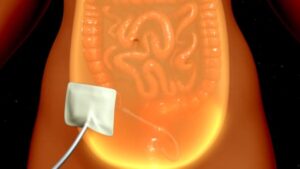Peritoneal Dialysis
Peritoneal dialysis in Navi Mumbai | Dr. Ravindra Nikalji
Peritoneal dialysis involves surgery to implant a peritoneal dialysis (PD) catheter into your abdomen. The catheter helps filter your blood through the peritoneum, a membrane in your abdomen. During treatment, a special fluid called dialysate flows into the peritoneum. The dialysate absorbs waste. Once the dialysate draws waste out of the bloodstream, it’s drained from your abdomen.
This process takes a few hours and needs to be repeated four to six times per day. However, the exchange of fluids can be performed while you’re sleeping or awake.

There are numerous different types of peritoneal dialysis. The main ones are:
- Continuous ambulatory peritoneal dialysis (CAPD). In CAPD, your abdomen is filled and drained multiple times each day. This method doesn’t require a machine and must be performed while awake.
- Continuous cycling peritoneal dialysis (CCPD). CCPD uses a machine to cycle the fluid in and out of your abdomen. It’s usually done at night while you sleep.
- Intermittent peritoneal dialysis (IPD). This treatment is usually performed in the hospital, though it may be performed at home. It uses the same machine as CCPD, but the process takes longer.
- Benefits
- Possible risks
One of the main advantages of PD over hemodialysis is that the procedure can be carried out in the comfort of the patient’s homes. For most, all that is required is a washroom with fresh running water, a sterile area of the house for the procedure to take place, and space to store the fluid for dialysis. This also allows patients to travel.
For elderly patients who may be unable to administer the procedure themselves, assistance may be given by a trained carer or community nurse. Additionally, the procedure can even be run while the patient sleeps
Peritoneal dialysis is associated with an increased risk for infections in or around the catheter site in the abdominal cavity. For example, after catheter implantation, a person can experience peritonitis. Peritonitis is an infection of the membrane lining the abdominal wall.
Other risks include:
- abdominal muscle weakening
- high blood sugar due to the dextrose in the dialysate
- weight gain
- hernia
- fever
- stomach pain
